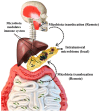From Microbiome to Malignancy: Unveiling the Gut Microbiome Dynamics in Pancreatic Carcinogenesis
- PMID: 40243755
- PMCID: PMC11988718
- DOI: 10.3390/ijms26073112
From Microbiome to Malignancy: Unveiling the Gut Microbiome Dynamics in Pancreatic Carcinogenesis
Abstract
Pancreatic cancer is a major cause of cancer-associated mortality globally, characterized by a poor prognosis and limited therapeutic response. The current approach for treating pancreatic cancer involves locoregional control with surgical resection and systemic therapy in the form of cytotoxic chemotherapy. However, despite standard-of-care treatment, the outcomes remain dismal. Emerging evidence suggests that the gut microbiota plays a significant role in pancreatic carcinogenesis through dysbiosis, chronic inflammation and immune modulation. Dysbiosis-driven alterations in the gut microbiota composition can disrupt intestinal homeostasis, promote systemic inflammation and create a tumor-permissive microenvironment in the pancreas. Moreover, the gut microbiota modulates the efficacy of systemic therapies, including chemotherapy and immunotherapy, by impacting drug metabolism and shaping the tumor immune landscape. This review is mainly focused on exploring the intricate interplay between the gut microbiota and pancreatic cancer, and also highlighting its dual role in carcinogenesis and the therapeutic response.
Keywords: bile acids; gut microbiota; metabolites; oncobiome; pancreatic cancer.
Conflict of interest statement
The authors declare no conflicts of interest.
Figures



Similar articles
-
Microbiota Alterations and Their Association with Oncogenomic Changes in Pancreatic Cancer Patients.Int J Mol Sci. 2021 Nov 30;22(23):12978. doi: 10.3390/ijms222312978. Int J Mol Sci. 2021. PMID: 34884776 Free PMC article. Review.
-
Potential Roles of the Gut Microbiota in Pancreatic Carcinogenesis and Therapeutics.Front Cell Infect Microbiol. 2022 Apr 6;12:872019. doi: 10.3389/fcimb.2022.872019. eCollection 2022. Front Cell Infect Microbiol. 2022. PMID: 35463649 Free PMC article. Review.
-
The Gut Microbiome and Pancreatic Cancer Development and Treatment.Cancer J. 2023 Mar-Apr 01;29(2):49-56. doi: 10.1097/PPO.0000000000000647. Cancer J. 2023. PMID: 36957973 Free PMC article. Review.
-
Impact of gut microbiome in the development and treatment of pancreatic cancer: Newer insights.World J Gastroenterol. 2023 Jul 7;29(25):3984-3998. doi: 10.3748/wjg.v29.i25.3984. World J Gastroenterol. 2023. PMID: 37476590 Free PMC article. Review.
-
The role of the microbiome in pancreatic oncogenesis.Int Immunol. 2022 Sep 6;34(9):447-454. doi: 10.1093/intimm/dxac036. Int Immunol. 2022. PMID: 35863313 Review.
References
-
- Sung H., Ferlay J., Siegel R.L., Laversanne M., Soerjomataram I., Jemal A., Bray F. Global Cancer Statistics 2020: GLOBOCAN Estimates of Incidence and Mortality Worldwide for 36 Cancers in 185 Countries. CA Cancer J. Clin. 2021;71:209–249. - PubMed
-
- Sickels A., Jain T., Dudeja V. Peritoneal Cell-Free DNA: A Novel Biomarker for Recurrence in Pancreatic Cancer. Ann. Surg. Oncol. 2023;30:6308–6310. - PubMed
Publication types
MeSH terms
LinkOut - more resources
Full Text Sources
Medical

